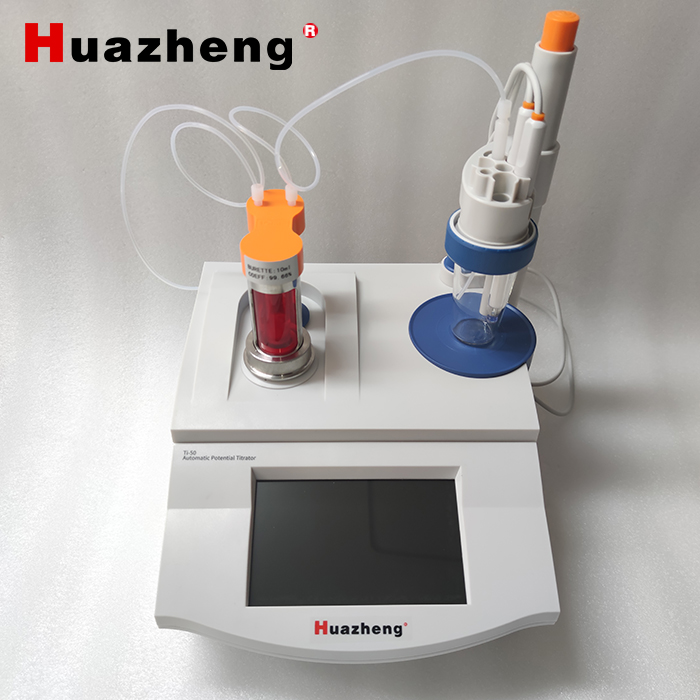
Please refer the Ti-50 Automatic potential titrator instruction manual before using,
and please note following problems:
⚫ Ensure a good grounding.
⚫ Prevent corrosive gas invasion.
⚫ Keep the instrument interface clean, dry, and avoid contact with acid, alkali,
salt solution.
⚫ This instrument is available to long-term stability. After test samples, the
electrode should be immersed in DI water.
⚫ Titrator is high precision measuring instrument, in order to avoid the damage of
high resistance devices, when the instrument does not connect with measuring
electrode, insert Q9 short circuit on its socket. When the instrument connects with
electrode, place the short-circuit plug in a dry, clean environment to prevent damp.
⚫ For long-term not in use, wash the burette with DI water, especially titrants
(such as AgNO3) that will cause crystallization or precipitation, (clean immediately
after using, in order to avoid damage of the valve.
1.1.1 Term Definition
◼ Pre-titration: No need to know titration end point in advance, the instrument
automatically search end point (the largest change rate of potential) in whole
titration process.
◼ Preset endpoint titration: The instrument will automatically stop titration when
reach the preset endpoint of mV or pH value.
◼ pH slope: The potential variation for each pH change, usually expressed as
mV/pH or %.
◼ pH E0: Also called “zero potential”, usually refers to the potential value of the
pH=7.
◼ pH one-point calibration: Calibrate with one pH buffer solution.
◼ pH multi-point calibration: Calibrate with two or more pH buffer solution.
1.1.2 Features
Model Ti-50 Automatic Titrator is a new product on the basis of model ZDJ-5. It has
below characteristics:
◼ Adopt new microprocessor technology, using 7 “TFT touch screen, reach 65 k
color; support simple operates by sliding.
◼ It is valve-burette integration that user can change directly, which reducing the
problem of interference between different solutions in different titration. It
supports various burettes 10 ml,20 ml.
◼ The transmission system has been improved to reduce the size of the meter
and noise during operation. The stirring system adopts PWM technology to
adjust the speed of stirring system.
◼ The meter supports upper stirrer.
◼ The titration system applies the material which resists perchloric acid and it
can perform non-aqueous titration.The meter supports double high impedance
input.◼ It can add a titrate unit to meet special requirements of customers, as group
titration of double pipes.
◼ It supports automatic calibration of pH electrode.
◼ Support multiple measuring units, such as potential measuring unit, dead-stop
measuring unit, conductivity measuring unit, etc; it takes potential measuring
unit as default configuration, users can also add measuring unit according to
their needs, such as dead-stop, conductivity, etc.
◼ It manages all titration by titration method, supports view, copy, edit and create
of titration methods; all titration methods include the equipment, such as
measuring unit, titrate unit and the parameters of the stirrer, measuring
parameters, measurement results, etc.
◼ There are different measurement methods corresponding to different
measuring unit. In potential measuring unit, it supports dynamic titration(DET
titration), endset titration, equivalent titration (EQU titration), constant titration,
manual titration and two titrations accompanied with the titrator.
◼ It has a good operation interface, easy to use, can real-time display relevant
test method, titration curve and measure results.
◼ The instrument controls the whole titration according to the process, allows
users to edit titration process and create special titration method to satisfy
inquiry applications.
◼ After titration, the meter can generate special titration modes directly which
enlarges the operating range. The meter can perform pH measurement, acid
and alkali titration, oxidation-reduction titration, precipitation titration,
complexometric titration and non-aqueous titration with different kinds of
electrodes.
◼ Support U disk, allow read-write of titration method and titration results.
◼ The meter supports titrant management, up to 5 kinds of titrants.
◼ The meter supports formula editor, allowing users to customize the result
calculation formula, including numbers, + - * / ( ), system variables,
user-defined variables, up to 50 characters long.
◼ The meter has USB interface and RS-232 which can be connected to the
computer. It is controlled by the professional software. It can display titration
curve and its first and second derivatives on the computer. It can edit and
modify the titration mode, and statistic.
◼ With the function of power-off protection, the meter will save the measuring
data and parameters when it is power off at un-normal condition.
◼ It can save 100 sets of titration methods.
◼ Support GLP Norm and can save 200 sets of titration data.
◼ It has statistical function, allows users to statistics, view, analyze and compare
titration results.
◼ Support electrode calibration, has management function of buffer group,
automatic identification of pH buffer GB, DIN, NIST, etc. Up to three-point
calibration.
◼ Support multiple approaches to start a titration, including from the initial interface, shortcut, titration method management, etc.
◼ Allow users to create shortcuts, create a shortcut for functions and titration
methods frequently used, and start directly.
◼ Support equipment management, allow debugging and control separately.
Management of each device.
◼ It has operation guides, simple and brief tips on normal operations,
convenience for users.
◼ Support user management, up to eight users; support password management.
◼ Support Chinese and English Language.
◼ Supports firmware upgrade, a variety of upgrade ways, including upgrade
directly with U disk.
1.1.3 Specifications
1. Measuring range
pH: (0.000~14.000)pH;
mV: (-1999.90~1999.90)mV;
Temp:(-5.0~105.0)℃.
2. Resolution
pH: 0.001pH;
mV: 0.01mV;
Temp:0.1℃.
3. Accuracy of electric unit
pH: ±0.01pH±1 bit;
mV: ±0.03% Full Scale;
Temp:±0.3℃.
4. Burette volume accuracy
10mlburette: ±0.025ml;
20mlburette: ±0.035ml.
5. Reproducibility of titration analysis: 0.2%.
6. Reproducibility of electric unit: ≤0.2mV.
7. Stability of electric unit: ±0.3 mV±1 bit/3h.
8. Sensitivity of controlling titration: ±2mV.
9. Normal working conditions
Environments temperature:(5.0~35.0)℃;
Relative humidity: ≤80%;
Power supply: (220±22)V, Frequency(50±1)Hz:
There should be no disturbance of electromagnetic field
10. Dimension (mm)
Main titration device: 340×400×400 (length × width × height);
Auxiliary titration device: 200×110×230 (length × width × height).
11. Weight(kg): about 10.